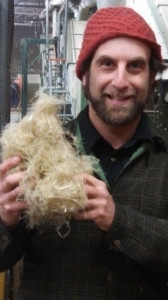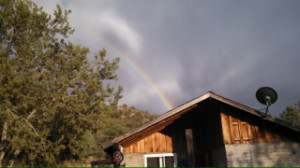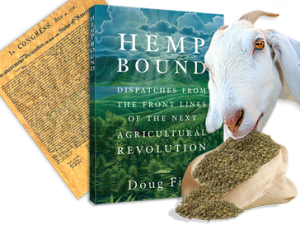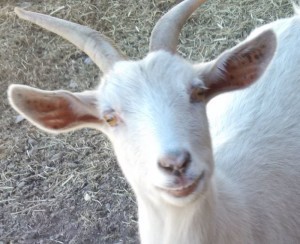Doug Fine's Blog, page 2
June 27, 2014
The Great Hemp Head Scratcher
AMERICAN HEMP SEEDS ARE GROWING, BUT…
Nothing like holding the Dutch hemp fiber that goes into Mercedes door panels (fresh off the factory floor, [above], they were silky soft yet stronger than steel) to make an investigative-minded fellow not just smile goofily but also wonder, “Why is the DEA seizing the seeds that will allow the U.S. to catch up with the rest of the world’s billion-dollar hemp industry?”
That’s the theme of an Oped I shot off to the Los Angeles Times this week:
http://www.latimes.com/opinion/op-ed/la-oe-fine-hemp-marijuana-legalize-20140626-story.html
There wasn’t space in the piece to include this detail, but my colleague and friend Jason Lauve, a fellow mentioned in Hemp Bound for his hemp legalization work, was one of the folks trying to get the latest batch of seized seed back into the ground for American farmers. Thanks, Jason – not only the cultivators, processors and entrepreneurs but the overall economy needs your efforts, and one day there’ll be a statue of you somewhere.
In fact, my sense is that American history books are going to refer to this period as The Great Head Scratcher. Indeed it’s hard for me to type when I’m scratching my own head.
Here’s what American farmers from South Carolina to Oregon are wondering as they assume the puzzled squint that accompanies the actual head scratching: “Is that possible? Is a rogue agency in my government really keeping its own nation’s economy from billions and its energy supply from getting more secure?”
Sigh. Alfalfa farmers don’t need to worry about seed seizure. Software companies don’t need to put “federal raids may occur” in the “risk disclosure” section of their prospectuses.
At least this nonsense is nearly over. It’s thrilling to watch major developments unfold every day, on this, the final, inexorable march to domestic commercial hemp cultivation and the massive associated economy.
I just wish the admittedly well-funded folks who reside laughingly on the wrong side of history would concede already. In chess it’s considered good form at this stage. Federal law has changed, for crying out loud. Hemp seed imports are legal for research purposes, and, as the Oped makes clear, necessary (because the U.S.’ world-leading seed stock was lost to prohibition).
For those who smell victory and want to help fully authorize commercial hemp cultivation once and for all, please call your U.S. Senators and urge support of S-359, The Industrial Hemp Farming Act. Its passage is a billion-dollar victory — on paper and short-term. Longer term, it could prove the turning point in humanity’s climate change mitigation efforts and transition to sustainable energy. I envision an annual parade on the date of Presidential signature. Something to do with the hands when we’re no longer head scratching.
Meanwhile, as the first Monsoon rains blessedly and noisily arrive here on the Funky Butte Ranch (check out the rainbow over the front porch below), thanks to everyone for getting their hands on Hemp Bound.
If you haven’t read it, it provides a blueprint for the above-mentioned lucrative and sustainable return of this vital agricultural economy and a model for community-based energy independence. Just that. Just a way to strengthen the nation in a manner that allows for the survival of our charmingly flawed species.
See you at the summer and fall Hemp Bound live events, from Pennsylvania to Slovenia. Both places, by the way, with major historic hemp industries.
“Doug Fine has created a blueprint for the America of the future…Hemp Bound is the best book of the year.” –Willie Nelson
Follow Me on Twitter (Organiccowboy): https://twitter.com/organiccowboy

The post The Great Hemp Head Scratcher appeared first on Doug Fine.
June 5, 2014
Wait. Hemp is Legal?
Thomas Jefferson’s Favorite Crop Is Back in American Soil — Today
Read All About It
“Hemp Bound is the best book of the year…Doug Fine has created a blueprint for the America of the future.”
–Willie Nelson
Since Hemp Bound was published just three weeks ago, four more states have legalized hemp cultivation. And not just those you might call the usual suspect states: we’re talkin’ Nebraska, Indiana, South Carolina and Tennessee. This on top of federal authorization of hemp research in this year’s Farm Bill. Heck, the DEA just turned over 286 pounds of hemp seed to Kentucky farmers. When did all this good governing start happening?
Hemp Bound proposes, through two years of worldwide field research, that these developments are important for humanity. If you agree, to spread the message to your peeps and keep the momentum going, please join a big one day rankings push.
Simply order your (or your third, or your colleague/boss/employee/aunt’s) copy of Hemp Bound any time today (Thursday) by clicking here. Or go to: http://amzn.to/1oefJsZ
(For people who like to support indie bookstores, so do I. This is to send a message that hemp is here to stay. Thanks for the indulgence.)
As a father who’d like to bequeath a livable climate, I send this Dispatch with massive thanks. In addition to hoping you’ll spread this missive far and wide by all media known (from Facebook to the platforms too hip for me to know about yet), one other request: while on Amazon please write lots of five star comments.
Now, I often miss these kind of one-day pushes and wonder, “Um. It’s Saturday. Should I still order it?” I checked, and the answer is, “Yes.”
On the live event side of things, at http://dougfine.com/events you can check out where the Hemp Bound live event, with its playbook for reviving the hemp economy, is coming to your community. At every one of the dozen tour stops so far, some entrepreneurs, farmers or processors have approached me about bringing the tri-cropping ideas expressed in Hemp Bound into the real world economy. (Tri-cropping, you’ll see in the book, is utilizing one hemp harvest for three applications: seed oil, fiber and energy.)
One of these events (complete with slide show, a 1735 hemp bound book an audience member brought, and my tales of taking a hemp-powered limo ride) was taped by C-Span. The first airing is at: http://www.c-span.org/video/?318921-1...
Even I can’t believe this is all really happening. Not to this extent. Not this fast. How did it go from the dream of my college roommate with the lava lamp to federal policy? I’m just grateful. So are American farmers. One hemp pioneer I followed in the book, Ryan Loflin, is clear about what hemp’s return means.
“It takes half the water that wheat does,” the 41-year-old Coloradan told me, scooping up a handful of drought-scarred soil so parched and sandy it evoked the Sahara. “And provides four times the income. Hemp is going to revive farming families in the climate change era.”
Also excited are my own Funky Butte Ranch goats, as you can see in the photo below: they’ll be getting homegrown hemp seed feed very soon, as will I.
-Doug Fine, Funky Butte Ranch, NM
P.S. I don’t even know what to say about this one except thanks to the one and only Willie Nelson, one of my principal role models. Asked to support this Hemp Bound rankings effort, he just Tweeted: Best book o’the year! Launch #HempBound 2 #Top10 on @amazonbooks w/1day push 2day &revive #America thru laughter http://amzn.to/1oefJsZ
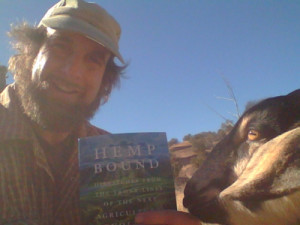
Taylor Swift, the Funky Butte Ranch nanny, attempts to take a bite out of an advance copy of Hemp Bound, April, 2014

The post Wait. Hemp is Legal? appeared first on Doug Fine.
April 21, 2014
another test
February 17, 2014
Hemp Returns To Humanity
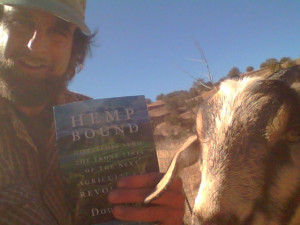
Multi-Species Appreciation For Hemp Bound’s Cover
I’m writing these words ten minutes after President Obama has legalized hemp. (If you’re not yet among the throngs pausing for collective pinching of self and recitation of, “God Bless America,” you will be, pretty soon.) He did this by signing the 2014 Farm Bill, which included a tucked-in bi-partisan amendment that allows university research of the crop.
I’m happy for real world reasons that go far beyond the fact that the President of the United States, together with the U.S. Congress, is now, albeit inadvertently, part of the marketing team for my new book. They in fact made the dream expressed in its first paragraph one big step closer to reality.
It goes, “my plan the day hemp becomes legal is to begin cultivating ten acres of the plant so that my Sweetheart no longer has to import from China the material she already uses to make the shirts I wear in media interviews to discuss the fairly massive economic value of hemp. In a cynical age, we can use one less irony.”
Imagine the government doing something that affects your life, at all, let alone positively and significantly. Hearing my three-year-old son belting out Herbie Hancock’s Chameleon on the kazoo outside my office reminds me that soon the four grand my family already spends on hemp products every year – including the seed oil in our morning shake – is going to be locally sourced. It’s not an exaggeration to say that in humanity’s eight thousand year relationship with the hemp plant, this past year has been the most impactful one since the first Paleolithic hunter with blistered feet noticed that hemp’s fibers made a stronger sandal than the leading brand.
The American re-embracing of its once most lucrative and important crop was indeed a move for the good of American farming, industry, and tax base. This I found when I saw the Canadian farmer and processor profit margin on its hemp harvest. It’s ten times that of wheat. We’ll have federal Hemp Appreciation long weekends in February or October some day. But when you take the long-term view, today qualifies as a mark-the-calendar day in human history, not just American history. That’s because our energy future just got a lot brighter and cleaner.
Hemp’s return is a bit overdue. Just for the record, here’s the timeline: hemp legal: twelve thousand years. Hemp illegal: seventy-seven. Just last week, a Stanford-led team discovered well-preserved hemp clothes at a nine thousand-year-old village site in Turkey. A nice ensemble, in fact, ranging from infant size to big-and-tall.
In fact, the publicity folks at my publisher have asked me to provide them a timeline more specific than “humans have widely used hemp for the past twelve millennia except, essentially because of a typo, for the past three quarters of a century.” So for those who like to see things itemized:
–10,000 BCE: Hemp in wide use for clothing, food and medicine. It is a “camp follower,” a seed that people take with them as they move. Hemp clothing found in good condition by Stanford-led team in 9,000-year-old Turkish village last week.
–Year Zero: Chinese pharmacopeia describes multiple cannabis-based remedies. Persians call hemp Shaah-daaneh, or “King of Seeds.”
–14th Through 20th Centuries: Hemp provides rigging and caulking for European Age of Exploration.
–1776: Thomas Jefferson drafts Declaration of Independence on hemp paper.
–1820s: U.S. government sponsors contests to produce domestic hemp that rivals expensive imports.
–19th Century: American West settled via wagons covered with hemp canvas.
–1850s-1930s: Kentucky hemp germplasm considered the world’s finest. Hemp industry employs thousands of farmers and processors in a dozen states. U.S. dominates world industry.
–1937: Hemp banned in the Marihuana Stamp Act.
–1942: Hemp For Victory propaganda film: Prohibition gets off to a poor start. Hemp re-legalized because Japanese have captured Filipino hemp sources (note that the drug war is already pushing industry offshore).
–1952: My grandmother moves to Hempstead, NY
–1994: In an executive order, President Bill Clinton includes hemp among “the essential agricultural products that should be stocked for defense preparedness purposes.”
–1996: Canada re-legalizes hemp.
–2002: BMW begins using hemp fiber in door panels, and still does.
–February 7, 2014:President Obama re-legalizes hemp by signing the 2014 Farm Bill. Canada’s fifteen-year-old market worth a billion dollars annually.
In the big scheme of things, it was a short, head-scratching separation between humans and their longest-utilized plant. But hemp’s reemergence comes at a time when we (I mean as a species) have some catching up to do.
My day job of the past several years (investigating the role of the cannabis plant in humanity’s economic and climate mitigation arsenal) has, due to irrefutable evidence, convinced me that it’s essential to bring one of our most useful plants back into the economy: I don’t think of hemp as having been “legalized” so much as “returning to its normal status.”
And yet two years ago a hemp legalization bill would have been (actually was) laughed off the out of Congress. In Hemp Bound’s fourth sentence, I call the plant’s abrupt jolt back into society’s toolbox an “astonishing no-brainer.” I mean, what crop is a Cheech joke one year and a major agricultural industry sector the next? Hemp agronomy is being taught today at Oregon State. In Hemp Bound I set out to explain why the plant has returned in such a big way and why it matters.
The short answer, according to more than one of the hemp agronomists I interviewed for the book, is that we can’t afford not to re-learn the ways to maximize this plant’s harvest, and quickly. Here’s one real-world example that, for an environmental journalist who has become convinced that petroleum is on its way out, was perhaps the most mind-blowing of the dozens of in-the-market hemp apps I’ve encountered in my research.
On a bright, subzero morning in Manitoba last year, I found myself sliding into a Canadian research facility and being shown a tractor body made entirely from hemp — hemp that was grown and cultivated just a few miles away. This is about as closed loop as it gets: powered by hemp, built from hemp (including the sealant that holds the contemporary curved hood design together), and doing the work to harvest the hemp and start the cycle all over again. I rapped my knuckles on said hood. I kicked it. Solid.
“Why hemp?” I asked research team leader Simon Potter of Manitoba’s Composites Innovation Centre. In Canada, hemp is a billion-dollar industry and is seeing growth of twenty percent per year.
“Because it’s stronger, cheaper and much less energy demanding than petroleum based plastics,” he said. “These are the industrial components of the future. We have no choice. Petroleum is done.”
But a digital age machine made out of a plant? “We’re past the experimental and into implementation with this,” Potter said. “You’ll be able to buy this product.” In exchange for a small franchising residual, I offered a model name of The Hemp Reaper, or my own online handle, OrganicCowboy.
This, and a lot of other very cool stuff, is what I researched for Hemp Bound. Here’s a short film about some more of the apps and players you’ll meet in the book.
At times when encountering this everywhere plant popping up like a jack-in-the-box in surprising industries during my four continent exploration, I felt like James Bond (hemp insulation, hemp body armor) and at times like the first human figuring out clothes (that hemp wardrobe I now wear to most of my interviews and a good deal of my goat milking – as my outermost layer, it outperforms wool, cotton and even linen as road warrior and as rancher material).
In short, after several years of in-the-field and in-the-lab research (and even though I realize that in declaring this I open myself to Pollyanna or even Chong jokes), I discovered that your roommate with the lava lamp was right about hemp. The thing about non-fiction is that I can only report what I find in the real world.
Hemp, or industrial cannabis, is going to be bigger than psychoactive cannabis (already one of the planet’s top earning crops), both to the worldwide economy and for the advancement of humanity. It can replace at once plastics and fossil fuels, while putting small farmers worldwide back in business on a profitable and soil-enhancing bridge crop and its locally-produced applications. Thus Hemp Bound is in many ways a follow-up to my earlier account at my efforts at petroleum-free living and ineffective goat-outsmarting, Farewell, My Subaru.
Hemp’s number one existing application in the New World today (the one enriching Canadians) is its seed oil, which is a genuine omega-balanced superfood (you’ll see in a forthcoming short film that I visited university studies on the nutritional content of eggs from hemp-fed chickens to seek out and then eat the facts).
In investigations that didn’t feel very much like work from Hawaii to Belgium, I saw that hemp’s stronger-than-steel fibers are already in BMW and Mercedes door panels, I visited Colorado’s first legal farmers and fields, and I even got to ride in a hemp-powered limo (snippets of all of these are in the short film above).
Hemp Bound also proposes a new, community-based sustainable energy grid paradigm based on carbon-friendly farm-waste combustion: that, to me, is the most important piece of the puzzle. Ya know, just a harvest that can allow us to wean from petroleum. It’s already happening in parts of Europe with other crops. And it’ll work with hemp.
You’ll notice I use the verb “can” in the previous sentence. It’s a different word than “will.” Will it happen? In Hemp Bound I suggest that it kind of must. Here’s how I put it in the book’s introduction:
“It isn’t so much that hemp, useful as we’re about to see it is, will automatically save humanity. It’s that the worldwide industrial cannabis industry can play a major role in our species’ long-shot sustainable resource search and climate stabilization project. For that to happen, the plant must be exploited domestically in ways upon which the marketplace smiles. No pressure: We fail? We just go extinct. The Earth’ll be fine.”
Now, optimism being, I believe, one of the prerequisites for successful parenting, I’m happy to disclose that reporting on the way hemp is bursting back on the human scene is not only revitalizing my patriotism and causing me to walk with a spring in my step whenever I think about the direction “drug” policy is taking, it’s allowing me to see tangible and navigable avenues by which my replicants and theirs might have an actual atmosphere in which to dwell in peace and plenty.
That’s how big this victory is. Biz school students: tear up your syllabus. Medical residents: recycle the textbook written by your pharma rep I mean professor. Farmers: get ready for the return of local soil microbiology. We’re on the cusp of what I think of as the Dr. Bronner’s Era, named for the fast-growing, hemp-using soap company that pays its executives no more than five times its lowest paid worker and operates on organic and fair trade principles. We locavore consumers are bringing about this new and finer era.
I will remember where I was when President signed the 2014 Farm Bill. The fact of the matter is, I can say after conducting twenty-two years of journalism from Rwanda to Tajikistan to Burma that in five year’s time we’ll see that hemp legalization is the most important change to U.S. policy since the end of segregation.
My own job at the moment is to get out and broadcast the terrific news that the human species is once again potentially sitting pretty to said species. It’s quite an astounding beginning to the (at the moment) seventeen-date spring tour that goes from Stanford U to Rice U, Portland to Philadelphia, crisscrossing the North American coasts with quite a lot of time spent in Colorado, when I say it out loud: It’s going to start out Across the Pond in Vienna for the High Level Segment of the UN Commission on Narcotic Drugs meeting, on Friday March 14 (I’ve been invited to speak).
My theme? The importance of ending the international drug war now that the U.S. is leading the way on the domestic front. Worldwide criminal enterprises will be crippled when their money laundering operations lose their source of revenue. Youth use rates of dangerous drugs decrease with legalization, and international legalization cannabis opens up a multi-billion-dollar industrial hemp market. This is about more than healthy hemp shakes: it’s about encouraging a farm waste-based community energy paradigm that is already liberating parts of Europe from fossil fuels entirely.
I’ll let you know how that goes – sign up to receive notices whenever I’m coming forth with one of these Dispatches. Twitter is also good for short daily updates on events, writing, radio, television and life as a carbon-neutral parent to human and goat kids.
I’ve been trying out my new Hemp Bound slide show and storytelling routine on said kids here on the Funky Butte Ranch. I figure goats and toddlers will understand my jokes about as well as Austrians or university students will (that is to say, I hope, very well). Interestingly, my goats in particular seem already to know many of the punc hlines. Want proof? You can see my milker Bjork smiling at the end of this Dispatch after one of my particularly devastating jokes. The only question my caprine family members appear to have is, “when do we start getting the locally-grown hemp feed?”
And so reluctantly blotting out what had been pretty loud cactus wren whole note accompaniment to my kite-flying younger son’s repeated chanting of “Hello, Neighbors!” at the local raven pair (he’s learned they can learn human speech), I fire up what readers of Farewell, My Subaru will know as the Ridiculously Oversized American Truck. It is time to head out for The Hemp Bound First Post-Prohibition Planting Tour.
My (human) kid, the three-year-old kazoo player and kite flier, almost has the ravens eating out of his hand. In fact he had them feeling so welcome that they often eat out of our barn. Which is to say they treat our chickens’ eggs like an all-you-can-eat take-out buffet. They also seem to like the kite, which is in the form of a butterfly, loping in lazy acrobatic loops around the vortex of my life.
As I adjust the rearview, I see my older offspring is dashing up to me now, too, gesticulating a clear “hold the presses!” message and carrying a thick roll of duck tape. Ah, yes, he’s remembered what I’ve forgotten (not an unusual occurrence): my conveyance has reached that stage.
I thank this five-year-old-sage out the window — he and eighty-one-year-old Willie Nelson are my principal role models these days. I say that because of the two hundred plus shows the Red-headed Stranger played last year at age eighty, and not just because he’s called Hemp Bound “a blueprint for the America of the future.” As for my son, I learn so much from his quickness to forgive alone. Also his “we only have this life, so we might as well enjoy it” default philosophy seems to be working out very well for him. I’ve seen him heal chronically depressed seniors in ten minutes.
Once I’ve got the truck rigged (music set, laptop open, cat hugged, then expelled, non-hemp bumper duct-taped), I realize I can’t leave yet. I kill the engine and leap out, sticking the landing from three stories up in the cab, and twelve seconds later I’ve discovered the newest hemp app: my younger son, the Raven Whisperer, age three point five, has used the spool of hemp twine that lives on the Funky Butte Ranch house porch (heretofore used in the garden to train our tomatoes and grapes) as this morning’s kite string. Significantly, I discover this after diving into a cholla cactus to avoid said dive-bombing kite.
The hemp twine held fast, I noticed, after removing the remaining thorns from my hip. Huh. What do you know? When it comes to steadying a butterfly-themed kites in these not-kidding-around spring gusts we get here at the lip of the Chihuahuan desert, hemp is proving superior to the leading brand.
Along the same lines, I consider it a culinary good sign that inside the house this morning while I wrote most of this Dispatch, my Sweetheart was seasoning a new stone mortar and pestle with hemp oil.
I should be clear that these aren’t even the sum of the field-testing hemp here undergone recently here on the Funky Butte Ranch. Economically and environmentally significant revelations like them come roughly weekly, now that I’m paying attention. Really, Hemp Bound could have been called Hemp Wins Again. Take ten seconds ago. Wow, that loose strand of ranch gate chicken wire didn’t even scratch my hemp shirt as I dashed toward the porch for final hugs and return-of-duct-tape. Tore through a cotton t-shirt last week like it was a Kardashian wedding license.
My mini-Me’s kite having very nearly crashed into my sternum (the youngster had let his concentration wander when one of the ravens suddenly responded with something audible) reminds me that I’m late as usual, flights in jeopardy. I’ve willingly missed them before, listening to the wrens love songs while meditating with my goats. Therein resides my sanity, is the basic summary of a recent TEDxTalk I gave called Why We need Goatherding in the Digital Age. That plus being able to see the stars, not believe too fully in any source of news I didn’t witness myself, and being able to drink untreated water. I just love that the Law of Cascading Hemp Applications seems to always balance an ancient one (my shirt) with a digital age, or at least fairly modern one (hemp kite string).
So I’m anything but stressed. Which is to say, when the basic physical laws of inertia are factored on a day this perfect, one can’t help but take a fatalistic view of travel.
But man, it’s hard to leave my family and the ranch. And not merely because it’s a truly gymnastic move to get back into The Ridiculously Oversized Truck these days, after a monsoon-season skid on the ranch’s Black Diamond Driveway ripped off both running board access steps to the gargantuan machine. As I kiss my human fam, even atop the lingering scent of combusted Kung Pao chicken from the truck’s exhaust, they all smell of the pears we’ve be pounding.
I’m pulling out at the peak of what has essentially been a perpetual magic hour today, thanks to clusters of silver clouds in a traffic jam at an elevation of about a thousand feet migrating like the sandhill cranes we’ve been seeing heading patiently north for spring. To my mind, their gracefully-Jurassic lurching posture as they dip into the nearby river is just that of another species who seem to like it here in quiet nowhere. In the aptly-named Land of Enchantment. No one appears to be in a hurry to leave.
Including me. But the reasons are good (how often does one travel the world announcing a “new” industry that’s actually one of humanity’s oldest and a total win for humanity then and now?). Also for some reason these chocolate kiss mountains spiraling toward me in a Julian fractal swirl (I’m telling you the Funky Butte Ranch driveway is bumpy) remind me that, when I’m on the road, there is almost always sushi and Thai food.
Circling away from the house and my humans, now I just have to get past my other kids, the goats. Yes, there is the snow white Bjork, giver of my protein (yogurt and cheese await my return), and escape artist Taylor Swift, lazily chewing their cud in front of me, knowing that their final hugs for a few days are forthcoming. They, too, sense that I’m in no real rush. I hop out to meditate with them for easily three full breaths, thinking this is what victory feels like.
Postscript: I hope I’ve begun to convince those who started this dispatch as hemp agnostic that recent industrial cannabis developments are real and they’re significant. To give one example, I’m excited to report that we might this year go beyond even the first prediction in Hemp Bound (that hemp would be legalized this year), which has already so remarkably come to pass. The footnote to that prediction predicts more. If HR 525, which is dancing around the U.S. Congress as I type, shows as much oomph as the hemp provision in the Farm Bill did, I can officially update my psychic social media status to “profoundly optimistic father.”
“If ever anyone needed proof that government meddling in markets is injurious to innovation, Hemp Bound dispels all doubt. With science and humor, Fine paints an alternative and optimistic future—one that makes growing hemp seem as exhilarating and necessary as clean air. Fine’s style and storytelling ability make this is one of the most fun books you’ll ever read about the future of farming.” –Joel Salatin, author of Everything I Want to Do Is Illegal
“The issue is simple: farmers need hemp, the soil needs hemp, forests need hemp, and humanity needs the plant that the good Lord gave us for our own survival. Hemp Bound tells us with detail and humor how to get to the environmental Promised Land. Doug has created a blueprint for the America of the future.” –Willie Nelson
“I never dreamed industrial hemp had so much promise until I read Doug Fine’s Hemp Bound. The book is not only fun to read, but it passes along fascinating insights about a farm crop that produces many food and fiber products and is adapted to areas where corn and soybeans are rarely profitable. As the author points out with gracious good humor, industrial hemp is not medical marijuana, and it should become a major farm crop in America as it has elsewhere –Gene Logsdon, author of Gene Everlasting and Holy Shit: Managing Manure to Save Mankind
“Doug Fine’s engrossing and eye-opening book reveals hemp’s role as a new source of food, energy, and raw materials. This absurd war on one of the world’s most useful plants is about to end, and everyone can declare victory. –Mark Frauenfelder, founder, Boing Boing
“In Hemp Bound, Doug Fine convincingly describes the proven value and amazing potential of the non-psychoactive variety of the cannabis plant. You can eat it, drink it, read it, tie it, wear it, drive it, live in it, and make money growing it, all while saving the soil and protecting the climate. This is an important story, engagingly told.” –Dr. William Martin, Senior Fellow, Drug Policy, Rice University’s Baker Institute, Houston, Texas
“A sweet, logical and funny argument for the potential of one of the world’s most dynamic cash crops.” –Kirkus Reviews
Follow Doug on Twitter @organiccowboy and pre-order Hemp Bound from any online or atomic bookstore.
February 1, 2014
Hemp Bound
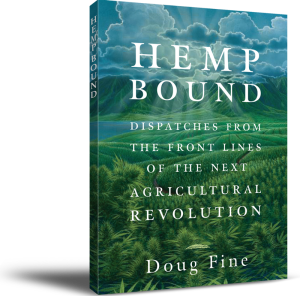
The billion dollar plant that’s going to change our diet and farms, help restore our soil, and wean us from petroleum.
Turns out your roommate with the lava lamp was right. Get ready for the game changing plant that’s going to feed the world and free us from fossil fuels while putting small farmers back to work. Yes, a writer of Doug Fine’s renown realized going in that the stat sheet on hemp sounded almost too good: its fibers are among the planet’s strongest, its seed oil the most nutritious, and its potential as an energy source vast and untapped? But he’s just researched it from the field, and guess what? It’s all true. In fact he’s uncovered new locavore energy application models that could and should change the energy economy (and improve the atmosphere) forever.
Hemp’s one downside? For nearly a century, it’s been effectively illegal to grow industrial cannabis in the United States—even though Betsy Ross wove the nation’s first flag out of hemp fabric, Thomas Jefferson composed the Declaration of Independence on it, and colonists could pay their taxes with it. But as the prohibition on hemp’s psychoactive cousin winds down, one of humanity’s longest-utilized plants is about to be reincorporated into the American economy. Get ready for the newest billion-dollar industry.

In Hemp Bound, Doug Fine convincingly describes the proven value and amazing potential of the non-psychoactive variety of the cannabis plant. You can eat it, drink it, read it, tie it, wear it, drive it, live in it, and make money growing it, all while saving the soil and protecting the climate. This is an important story, engagingly told.
~Dr. William Martin, Senior Fellow, Drug Policy, Rice University's Baker Institute, Houston, Texas

Doug Fine’s engrossing and eye-opening book reveals hemp’s role as a new source of food, energy, and raw materials. This absurd war on one of the world’s most useful plants is about to end, and everyone can declare victory.
~Mark Frauenfelder, founder, Boing Boing

I never dreamed industrial hemp had so much promise until I read Doug Fine's. The book is not only fun to read, but it passes along fascinating insights about a farm crop that produces many food and fiber products is adapted to areas where corn and soybeans are rarely profitable. As the author points out with gracious good humor, industrial hemp is not medical marijuana, and it should become a major farm crop in America as it has elsewhere
~Gene Logsdon, author of Gene Everlasting and Holy Shit: Managing Manure to Save Mankind

The issue is simple: farmers need hemp, the soil needs hemp, forests need hemp, and humanity needs the plant that the good Lord gave us for our own survival. Hemp Bound tells us with detail and humor how to get to the environmental Promised Land. Doug has created a blueprint for the America of the future.
~Willie Nelson

If ever anyone needed proof that government meddling in markets is injurious to innovation, Hemp Bound dispels all doubt. With science and humor, Fine paints an alternative and optimistic future—one that makes growing hemp seem as exhilarating and necessary as clean air. Fine’s style and storytelling ability make this is one of the most fun books you’ll ever read about the future of farming.
~Joel Salatin, author of Everything I Want to Do is Illegal

A sweet, logical and funny argument for the potential of one of the world’s most dynamic cash crops.
~Kirkus
In Hemp Bound: Dispatches from the Front Lines of the Next Agricultural Revolution , bestselling author Doug Fine embarks on a humorous yet rigorous journey to meet the men and women who are testing, researching, and pioneering hemp’s applications for the twenty-first century. From Denver, where Fine hitches a ride in a hemp-powered limo; to Asheville, North Carolina, where carbon-negative hempcrete-insulated houses are sparking a mini housing boom; to Manitoba where he raps his knuckles on the hood of a hemp tractor; and finally to the fields of east Colorado, where practical farmers are looking toward hemp to restore their agricultural economy—Fine learns how eminently possible it is for this long misunderstood plant to help us end dependence on fossil fuels, heal farm soils damaged after a century of growing monocultures, and bring even more taxable revenue into the economy than its smokable relative.
Fine’s journey will not only leave you wondering why we ever stopped cultivating this miracle crop, it will fire you up to sow a field of it for yourself, for the nation’s economy, and for the planet.
In Doug’s own words: This book didn’t feel like work (OK, maybe researching hemp oil presses in Manitoba in February felt a little like work, but the Hawaii and Belgium parts didn’t). I knew I was on to something big, and realized mid-way through my research that I would be publishing this book just as the U.S. Congress was re-legalizing this longest-utilized of plants. Yep, rejoice, patriots! Hemp is about to be legalized in the U.S., and soon North Dakotans, Coloradans and Kentuckians will be growing our food, fuel, industrial components and clothing. This has been simply an amazing project to investigate. I got to drive in a hemp-powered limo, meet Czech women-owned hemp cooperative farms, even see an actual tractor body made out of hemp (it’s already in BMW door panels). And yet here (for a brief time longer) it’s a federal felony to grow it, even though Americans consume a billion dollars of Canadian hemp every year, mostly in health food products. I know I consume thousands personally.
The book is a blueprint both for the putative hemp farmer and entrepreneur (based on what I learned from the rest of the world’s head start) and a model for just a little thing called weaning from petroleum (something I’ve been keen on every since writing Farewell, My Subaru). Popular Mechanics, in 1938, said hemp had 25,000 applications. Let me give you an advance tip about two of the biggest ones (they’re interconnected): domestic hemp reintegration represents a viable, community based energy grid model — one which Germany and Austria are already taking advantage of — as well as a soil-restoring nutritive superfood. And that’s just the tip of the iceberg, just part of the reason that the Persians have called hemp The King of Seeds for three Millennia. Hope you come along and enjoy the ride. Me, I’m off to milk the goats. I’m excited to soon be feeding them locally-grown hemp seed.
January 21, 2014
Too High To Fail
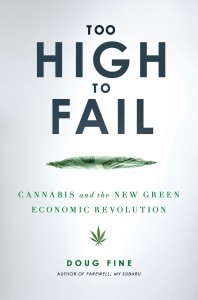 From the bestselling author of Farewell, My Subaru, Too High to Fail is the first in-depth look at the burgeoning legal cannabis industry and how the “new green economy” is shaping our country.
From the bestselling author of Farewell, My Subaru, Too High to Fail is the first in-depth look at the burgeoning legal cannabis industry and how the “new green economy” is shaping our country.
The nation’s economy needs a jump start, and there’s one cash crop that has the potential to help turn it around: cannabis (also known as marijuana and hemp). According to Time, the legal medicinal cannabis economy already generates $200 million annually in taxable proceeds from a mere five hundred thousand registered medical users in just sixteen states. Though thanks to Dick Nixon and America’s longest war — the War on Drugs — cannabis is still technically synonymous with heroin on the federal level even though it has won mainstream acceptance nationwide – 51% of Americans support full legalization (cannabis regulated for adults like alcohol), and 80% support medicinal cannabis legalization.
ABC News reports that underground cannabis’s $35.8 billion annual revenues already exceed the combined value of corn ($23.3 billion) and wheat ($7.5 billion). Imagine if the American economy benefited from those numbers, instead of going into criminal drug gang bank accounts. Actually, you don’t have to imagine: it’s already happening in Canada and Europe, though as yet U.S. leaders won’t heed the call to end the forty-year, trillion-dollar Drug War you have been financing to almost no effect since 1971.

An important book.
~Michael Pollan

In his entertaining new book…(Fine) successfully illuminates an unusual world where cannabis growers sing ‘Happy Birthday’ to (friendly law enforcement) while crossing their fingers against the threat of federal raids.This informative book will give even hardened drug warriors pause.
~Publisher’s Weekly

Fine examines how the American people have borne the massive economic and social expenditures of the failed Drug War, which is ‘as unconscionably wrong for America as segregation and DDT.’ A captivating, solidly documented work rendered with wit and humor.
~Kirkus (Starred Review)

Fine has written a well-researched book that uses the clever tactic of making the moral case for ending marijuana prohibition by burying it inside the economic case.
~Bill Maher in The New York Times
Considering the economic impact of cannabis prohibition—and its repeal—Too High to Fail isn’t a commune-dweller’s utopian rant, it’s an objectively (if humorously) reported account of how one plant can drastically change the shape of our country, culturally, politically, and economically.
In what can now be called his usual wild, hysterical fashion, and with typically impeccable investigative journalistic result, globe trotting, vegetable oil truck-driving rugged individualist goat herder Doug Fine extrapolates a model for the multi-billion-dollar legal, sustainable, cartel-crippling economy that can result when the failed Drug War is finally called off and cannabis is regulated like alcohol in North America.
Too High to Fail covers everything from a brief history of hemp to an insider’s perspective on a growing season in Mendocino County, California, where cannabis drives 80 percent of the economy (to the tune of $8 billion annually). Fine follows one plant from seed to patient in the first American county to fully legalize and regulate cannabis farming. He profiles an issue of critical importance to lawmakers, venture capitalists, climatologists and ordinary Americans—whether or not they inhale.
In classic Doug Fine fashion, Too High to Fail is a wild ride that includes swooping helicopters, college tuitions paid with cash, cannabis-friendly sheriffs (a decorated lawman who says, “I woke up and realized the sun still rises and there is still an America with legal cannabis”), and never-before-gained access to the world of the emerging legitimate, taxpaying “ganjaprenneur.”
#videoshowcaseid-1 {text-align: center;}#videoshowcaseid-1 .vsc-video-container {width: 383px;vertical-align: top;}#videoshowcaseid-1 .vsc-video-container a,#videoshowcaseid-1 .vsc-video-container a img {width: 383px;height: 215px;}
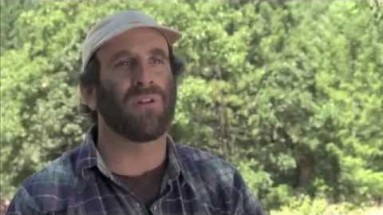
Too High To Fail short film
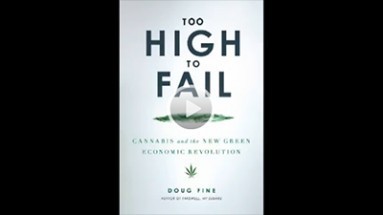
Doug on Conan
December 21, 2013
Farewell, My Subaru
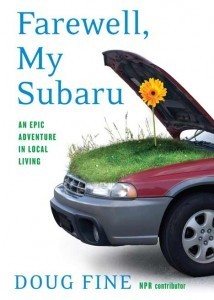 Like many Americans, Doug Fine enjoys his creature comforts, but he also knows full well that they’ve to this point kept him addicted to oil. So he wonders: Is it possible to keep his Netflix and his car, his Wi-Fi and his subwoofers, and still reduce his carbon footprint?
Like many Americans, Doug Fine enjoys his creature comforts, but he also knows full well that they’ve to this point kept him addicted to oil. So he wonders: Is it possible to keep his Netflix and his car, his Wi-Fi and his subwoofers, and still reduce his carbon footprint?
In an attempt to find out, Fine ups and moves to a remote ranch in New Mexico where (to the amusement of 90th generation locals) he brazenly vows to grow his own food, use sunlight to power his world, and drive on restaurant grease. Never mind that he’s never raised so much as a chicken or a bean. Or that he has no mechanical or electrical skills.
Whether he’s installing Japanese solar panels, defending the goats he found on Craigslist against coyotes, or co-opting waste oil from the local Chinese restaurant to try and fill the new “veggie oil” tank in his ROAT (short for Ridiculously Oversized American Truck), Fine’s extraordinary undertaking makes one thing clear: It is easy being green, provided your solar panels don’t electrocute you, your goats don’t outsmart you, and your vegetable oil-powered truck exhaust doesn’t give you the munchies (it smells like Kung Pao chicken). In fact, Doug’s journey uncovers a slew of surprising facts about alternative energy, organic and locally grown food, and climate change.
Both a hilarious romp and an inspiring call to action, the international bestseller Farewell, My Subaru makes a profound statement about trading today’s instant gratifications for a deeper, more enduring kind of satisfaction.

A chuckle or a wry grin is waiting on every page, if not each paragraph. It’s the kind of humor that builds gradually, that sneaks up on you with such stealth that you hardly even realize what a good time you’re having until it’s all over. By the end of Farewell, My Subaru you can think of nothing that would seem like more fun than hanging out at Fine’s ranch, vainly striving to keep his goats from eating the rose bushes. Think James Herriot’s All Creatures Great and Small — updated as appropriate for the iPod generation.
~Salon

Fine survives drought, biblical floods, and UN-hating [ranchers] as he gradually becomes ’solarized’ …along the way readers will root for this dry sharp wit and his rosy green dream. Fine’s funny struggle to become a better world citizen will entertain both the eco-aware, and those who doze peacefully in their home’s formaldehyde fumes.
~Bookpage

This is Green Acres for the smart set–– a witty and educational look at sustainable living. Buy it, read it, compost it.
~AJ Jacobs, author of The Year of Living Biblically

He is Bryson funny.
~Santa Cruz Sentinel

The details of Doug Fine’s experiment in green living are great fun…what we are built for. It’ll make you want to move!
~Bill McKibben, author of Deep Economy: The Wealth of Communities and the Durable Future

Fine is an eco-hero for our time.
~Miami Herald

Fine is a…storyteller in the mold of…Douglas Adams. If you’re a fan of Hitchhiker’s Guide to the Galaxy-style humor — and also looking to find out how to raise your own livestock to feed your ice-cream fetish — Farewell, My Subaru may prove a vital tool.
~Washington Post
November 21, 2013
Not Really An Alaskan Mountain Man
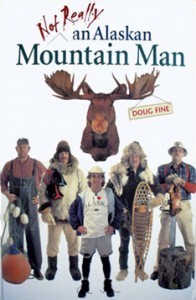 Now here’s a formula for near disaster: East Coast big-city guy, world-traveler, journalist, and otherwise politically savvy fellow settles down in rural Alaska, where men are many and manly, and women with survival skills are good to count among your friends. He wants to fit in. But how does one learn to be a Mountain Man? By observing, imitating, and making near-fatal mistakes, that’s how.
Now here’s a formula for near disaster: East Coast big-city guy, world-traveler, journalist, and otherwise politically savvy fellow settles down in rural Alaska, where men are many and manly, and women with survival skills are good to count among your friends. He wants to fit in. But how does one learn to be a Mountain Man? By observing, imitating, and making near-fatal mistakes, that’s how.
The choices a boy has to make. Eat processed food or on-the-hoof food, learn to operate a chainsaw or freeze to death, figure out what a bunny boot is or lose a few toes, and by the way, which end of he barrel points up? This is the story of Doug’s first difficult winter in a one-room cabin, trying to stay alive and come out of it with some semblance of Alaska cool.
With side-splitting, self-depreciating humor, Doug shares his attempts to elevate himself past his perpetual state of greenhorn-ness by aligning himself with tough sourdoughs to someday claim the title of manly Mountain Man.
October 17, 2013
The Doug Fine TEDxTalk: The Return of the Indigenous Gene
I’m probably one of only a handful of TED fans (let alone speakers) who has slept outside with his goats to protect them from coyotes like some kind of crunchy Elmer Fudd. And that in fact is the theme of my recent TEDxABQ talk, The Return of the Indigenous Gene: Why We Need Goatherding in the Digital Age.
I was as surprised as anyone to learn this, but it turns out we don’t have to choose between a Steve Jobs and a Grizzly Adams lifestyle. The heart of the Talk (which was a delightful, slightly scary — because scriptless — experience in front of an audience of 2,000 in Albuquerque) is my belief, cultivated during the half decade since writing Farewell, My Subaru, that encouraging a sweet spot between digital age life and our indigenous selves might play a major role in saving humanity. Which is to say, while researching and writing about the sea change underway in worldwide drug policy, I’ve still been busily cultivating the carbon-neutral good life. In fact, right now I’m eating an egg one of my ducks was kind enough to give me. Well, exactly right now I’m wiping yolk off my keyboard. I’m not saying that finding the sweet spot will be easy. Just fun and important.
In other news, Too High to Fail is cruising along in paperback, my Drug Peace Bumblebee columns are now archived, and my just-finished next book, about the almost unfathomably lucrative future of industrial hemp, comes out in March — on hemp paper. It’s called Hemp Bound.
Do I sound thrilled? I am. I’ve waited two decades to make the tree-free leap. Now I finally have a legitimate answer when a sharp college student during a post-live event Q and A asks me how a sustainability journalist comes to be writing books printed on harvested forests. All it took was research in Manitoba in February. More info on this fun project to come in future dispatches, and I often announce developments first on Twitter, including the dates of my soon-to-be announced five nation European live event tour.
In other news, following a fairly intense week-long river trip on a flooded New Mexico wilderness stream (I’m waking up every morning still feeling like I’m in a current, and I’m not complaining), I’m just starting a new book, about which more soon. I’ve been having a blast doing my preliminary research — always a good sign, and easy when not taking place in Manitoba in February.
For now, I’m off to milk the goats right at moonrise. As always, thanks beyond words for giving mind and heart time to my work.
October 16, 2013
The Doug Fine TEDxTalk: The Return of the Indigenous Gene
I’m probably one of only a handful of TED fans (let alone speakers) who has slept outside with his goats to protect them from coyotes like some kind of crunchy Elmer Fudd. And that in fact is the theme of my recent TEDxABQ talk, The Return of the Indigenous Gene: Why We Need Goatherding in the Digital Age.
I was as surprised as anyone to learn this, but it turns out we don’t have to choose between a Steve Jobs and a Grizzly Adams lifestyle. The heart of the Talk (which was a delightful, slightly scary — because scriptless — experience in front of an audience of 2,000 in Albuquerque) is my belief, cultivated during the half decade since writing Farewell, My Subaru, that encouraging a sweet spot between digital age life and our indigenous selves might play a major role in saving humanity. Which is to say, while researching and writing about the sea change underway in worldwide drug policy, I’ve still been busily cultivating the carbon-neutral good life. In fact, right now I’m eating an egg one of my ducks was kind enough to give me. Well, exactly right now I’m wiping yolk off my keyboard. I’m not saying that finding the sweet spot will be easy. Just fun and important.
In other news, Too High to Fail is cruising along in paperback, my Drug Peace Bumblebee columns are now archived, and my just-finished next book, about the almost unfathomably lucrative future of industrial hemp, comes out in March — on hemp paper. It’s called Hemp Bound.
Do I sound thrilled? I am. I’ve waited two decades to make the tree-free leap. Now I finally have a legitimate answer when a sharp college student during a post-live event Q and A asks me how a sustainability journalist comes to be writing books printed on harvested forests. All it took was research in Manitoba in February. More info on this fun project to come in future dispatches, and I often announce developments first on Twitter, including the dates of my soon-to-be announced five nation European live event tour.
In other news, following a fairly intense week-long river trip on a flooded New Mexico wilderness stream (I’m waking up every morning still feeling like I’m in a current, and I’m not complaining), I’m just starting a new book, about which more soon. I’ve been having a blast doing my preliminary research — always a good sign, and easy when not taking place in Manitoba in February.
For now, I’m off to milk the goats right at moonrise. As always, thanks beyond words for giving mind and heart time to my work.
Doug Fine's Blog
- Doug Fine's profile
- 14 followers


